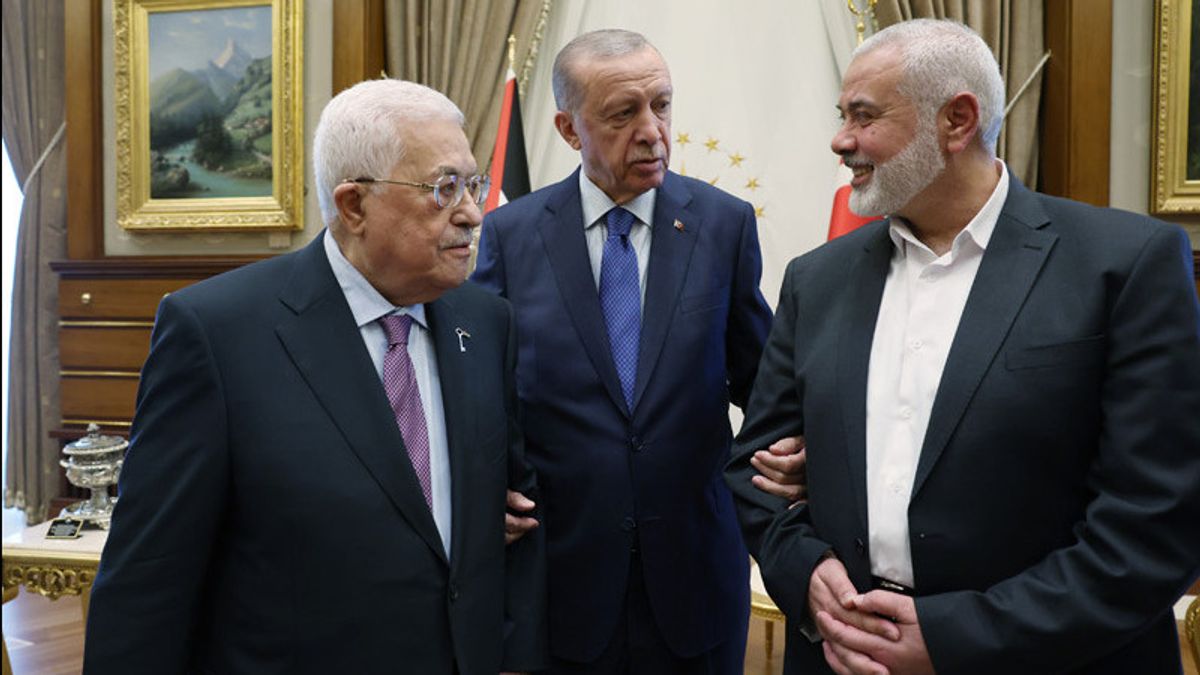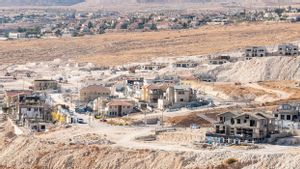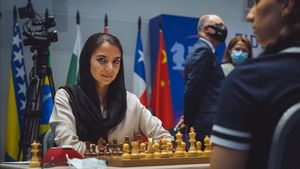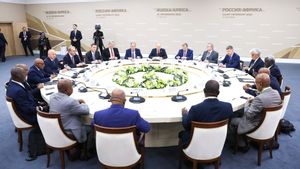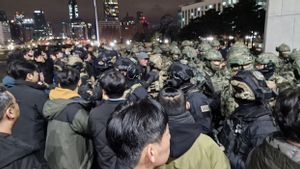JAKARTA - The leaders of Hamas and Fatah are pursuing reconciliation efforts with the aim of working towards a consensus unity government, ahead of a meeting of Palestinian factions in Cairo, Egypt this weekend.
Turkish President Recep Tayyip Erdogan brokered a meeting with Fatah's President Mahmoud Abbas and Hamas political bureau chief Ismail Haniyeh on Wednesday.
President Erdoğan told the meeting, which was held behind closed doors in Ankara, that the lack of unity among Palestinians benefits those who "want to destroy peace", according to the Turkish President's Office, reported by The National News, July 28.
A source close to Hamas told The National the meeting in Ankara was focused on the possibility of forming a national consensus government with the participation of all Palestinian factions.
However, Fatah leaders stuck to their terms, both Hamas and Palestinian Islamic Jihad, based in the Hamas-ruled Gaza Strip, openly recognizing the Palestine Liberation Organization (PLO) as the sole representative of the Palestinian people.

Fatah Revolutionary Council member Tayseer Nasrallah said he was concerned there could be a challenge to forming a unity government, giving Hamas's position on the PLO and "handing over power to the Palestinian Authority in Gaza" as examples.
In 2021, Abbas called for presidential elections to be held in the West Bank and Gaza, a move welcomed by opposition groups such as Hamas and former Fatah members who now oppose the president.
But, Abbas later called off the election, citing Israel's deterrence of voting in East Jerusalem.
Another point of contention regarding the potential for a unity government, Nasrallah told The National, is Hamas' refusal to cooperate with the Palestinian Authority to "hold elections in Gaza".
The Palestinian presidency said earlier this week that Abbas had "invited all Palestinian factions, including Hamas and Palestinian Islamic Jihad", to attend a meeting of the faction heads in Cairo on Sunday.
"The meeting will discuss how to deal with aggression against the Palestinian people, especially from the extremist Israeli government, and to strengthen Palestinian unity," according to a statement by the Palestinian Presidency.

Abbas and Haniyeh themselves met in Algeria last year, their first public meeting in more than five years. In October, the two factions signed the "Algerian Declaration", pledging to hold elections within one year for the presidency and the Palestinian Legislative Council, which acts as a parliament for Palestinians in the occupied territories.
In addition, Hamas and Fatah representatives have met several times over the past decade in Cairo to hold "last chance" reconciliation talks.
Analysts said the main focus of Sunday's discussions in the Egyptian capital would be reaching a compromise, given that Fatah and Hamas each face challenges in governing the Israeli-occupied West Bank and Gaza.
"One of the potential options to resolve the internal Palestinian conflict is to form a national government," said Nasser Khdour, a political analyst who focuses on the Palestinian-Israeli dynamic.

"Fatah is grappling with a crisis of legitimacy and struggling to control armed insurgencies in the West Bank, while Hamas is struggling with economic challenges in the Gaza Strip," he continued.
"Creating a joint government can lighten some of the governance burdens faced by Hamas. However, it is important to note, this government will only be a temporary solution," he said.
Further steps were needed, he added, "such as restructuring the PLO, involving Hamas and the PIJ in the decision-making process, and reaching a consensus on a national plan with clear goals and means".
"Otherwise, such national unity will not continue," he stressed.
Separately, analysts said President Erdogan had tried to convince Hamas to agree to recognize the Fatah-dominated PLO as the sole Palestinian representative, brokering compromises on smaller issues.
"I believe that what has happened in Ankara is a continuation of the talks that started in Algeria last year, that they have focused on finding a compromise on key points, especially Fatah's demand for recognition of the sole representation of one party," explained the Palestinian political analyst, Ashraf Al Aaka to Sky News Arabia.

"What makes the upcoming talks in Cairo different this time are the realities on the ground with the Israeli aggression against Jenin and the expansion of settlers uniting factions to show a united front for the Palestinian people," he said.
Israel has occupied the West Bank since the 1967 war. Since early last year, the territory has been the scene of increasing violence, with a series of attacks by Palestinians on Israeli targets, Israeli military attacks on suspected attackers, and violence by Israeli settlers against Palestinian communities.
Earlier this month, the military carried out a two-day assault on Jenin in one of the largest operations carried out by the Israeli army in the West Bank in years.
According to analysts, who distinguished Sunday's meeting in Cairo this time, the call for talks came from within Fatah.
"Unlike previous attempts, this effort was born naturally and is the result of internal Palestinian pressure and not external forces," said Palestinian writer Daoud Kuttab.
VOIR éGALEMENT:
"Because we had so many breached agreements it's hard to be optimistic, but a lot of important things seem to be in sync this time around," he continued.
Kuttab, who is also the founder and former director of the Institute for Modern Media at Al Quds University in Ramallah, added that Fatah and Hamas were expected to compromise in any agreement reached over the weekend.
"There is a good chance of finding some kind of language that is acceptable to Palestinians and language that will not dissuade or upset Americans and Israelis," he explained.
The English, Chinese, Japanese, Arabic, and French versions are automatically generated by the AI. So there may still be inaccuracies in translating, please always see Indonesian as our main language. (system supported by DigitalSiber.id)
